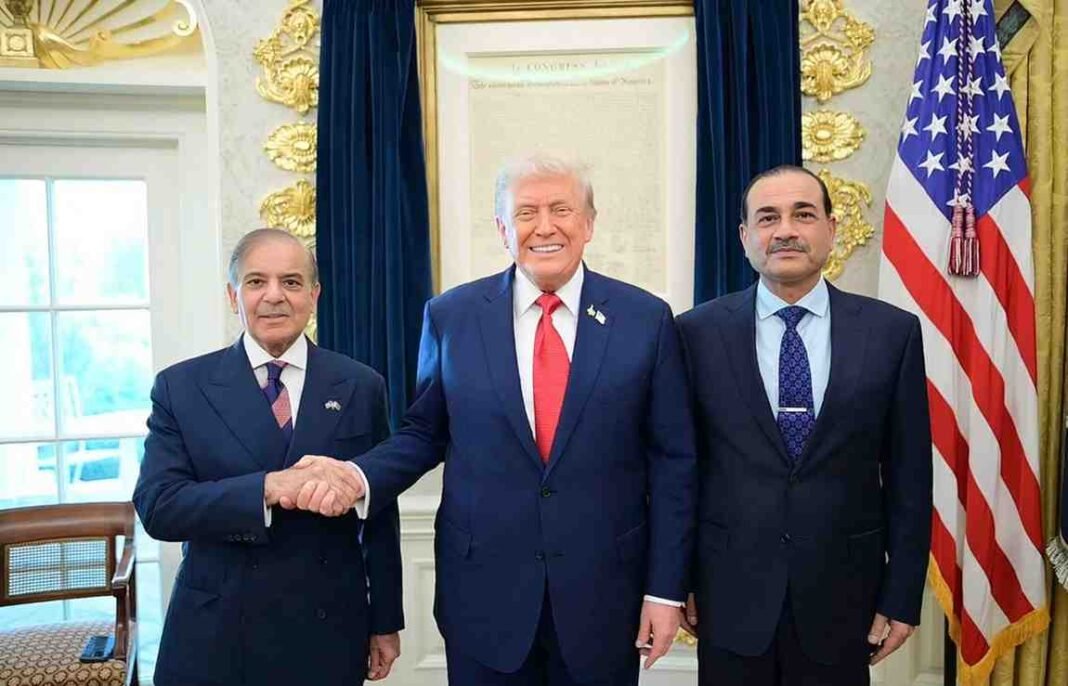White House Meeting Signals Reset in Relations
In a high-profile engagement at the White House, US President Donald Trump met Pakistan’s Prime Minister Shehbaz Sharif and Army Chief Field Marshal Asim Munir on Thursday. The meeting, held in the Oval Office, highlighted a cautious but visible thaw in US-Pakistan relations after years of strained ties. Secretary of State Marco Rubio also joined the discussions, underlining the significance Washington now places on engaging Islamabad at multiple levels of leadership.
Trump, speaking to reporters before the meeting, described the visiting leaders as “great men” and suggested they might already be in the room, a remark that underscored his characteristic improvisational style. “We have a great leader coming, the Prime Minister of Pakistan, and the Field Marshal. Field Marshal is a very great guy, and so is the Prime Minister,” Trump said, signaling unusual warmth toward both civilian and military leadership.
Leaders Kept Waiting Before Oval Office Talks
The meeting did not begin immediately upon the Pakistani delegation’s arrival. According to reports, both Sharif and Munir had to wait nearly 30 minutes at the White House while Trump wrapped up prior engagements and signed executive orders. Although this detail was not officially confirmed, press pool photographs appeared to capture the two leaders waiting inside the presidential residence.
Sharif’s motorcade reached the White House at 4:52 pm, and he was seen departing alongside Munir around 6:18 pm. While the wait may have been inconvenient, the encounter itself marked the first official White House meeting for a Pakistani prime minister since Imran Khan’s visit in July 2019.
Trump’s new BFF in South Asia: PAKISTAN.
He met with Pakistani puppet Prime Minister and, for the third time, Pakistan’s military chief (the real guy in charge) at the White House yesterday.
Not good for India. Probably not good for China either. Chaos is coming to the region. pic.twitter.com/FBAyNxYG0w
— S.L. Kanthan (@Kanthan2030) September 26, 2025
Trade Deals and Critical Minerals on the Agenda
Behind the symbolism lay important economic discussions. Earlier this month, Sharif and Munir presided over the signing of two memorandums of understanding in Islamabad, signaling a new direction in Pakistan’s economic diplomacy. One of the agreements included a commitment to supply critical minerals and rare earth elements to the United States, with a US firm pledging $500 million in investment.
This builds upon Trump’s earlier promise to help Pakistan develop its substantial oil reserves. The White House emphasized that the trade deal announced this month would strengthen bilateral economic ties, particularly through a 19 percent tariff structure on Pakistani imports. In 2024, total US-Pakistan goods and services trade reached $10.1 billion, a 6.3 percent increase over the previous year, with Washington recording a trade deficit of $3 billion.
Security Cooperation in a Shifting Regional Context
Strategic calculations are also driving renewed engagement. Pakistan’s military leadership, long central to the country’s relations with Washington, has been hosted three times in the past few months, underscoring the Pentagon’s interest in sustaining dialogue. The latest interactions come after a tense military standoff between India and Pakistan earlier this year, during which Trump claimed to have personally mediated a ceasefire.
Although India has strongly denied US involvement, Islamabad has not only acknowledged Trump’s intervention but even nominated him for the 2026 Nobel Peace Prize for his “decisive diplomatic leadership.” The nomination reflects Pakistan’s intent to leverage Trump’s self-styled image as a global dealmaker, while signaling gratitude for US support at a sensitive time.
From ‘Lies and Deceit’ to ‘Great Leaders’
The White House meeting represents a dramatic shift in tone from Trump’s past remarks. In 2018, he accused Pakistan of providing “nothing but lies and deceit” while allegedly sheltering terrorists, including Osama bin Laden. At that time, Washington sharply cut military and financial assistance to Islamabad, bringing relations to a historic low.
Now, however, Trump’s language has transformed. By calling both Sharif and Munir “great leaders,” he has opened a diplomatic door Pakistan has been eager to re-enter. Analysts suggest that Washington’s renewed interest is tied not only to trade but also to Pakistan’s geostrategic importance amid shifting dynamics in South Asia and the broader Indo-Pacific.
Looking Ahead
While Thursday’s meeting did not produce a sweeping joint statement, it signaled the beginning of a recalibrated relationship. For Pakistan, the optics of being welcomed at the White House after years of estrangement are a diplomatic win. For the US, securing access to critical minerals, ensuring stability in South Asia, and keeping Islamabad aligned with American interests form the backbone of this evolving partnership.
The coming months will reveal whether this engagement translates into sustained cooperation or remains a symbolic gesture. What is clear, however, is that the meeting of Sharif, Munir, and Trump has reopened a channel that had long been dormant.








